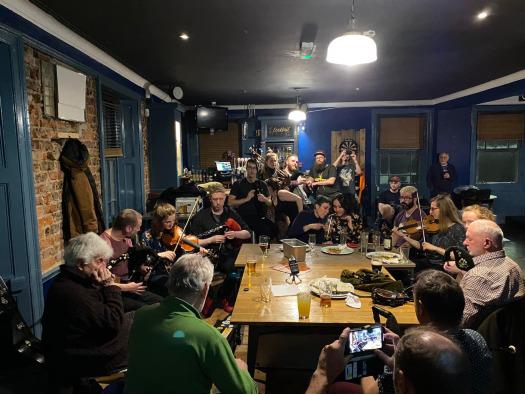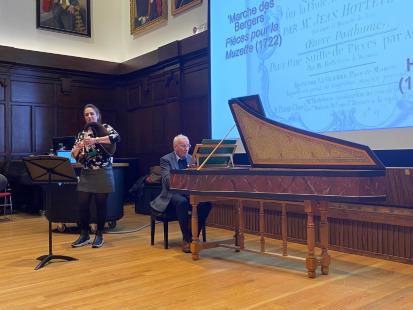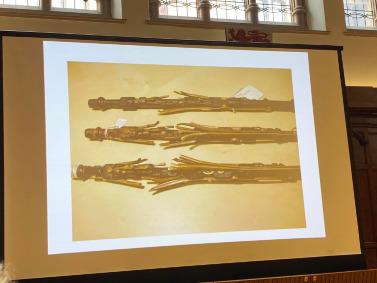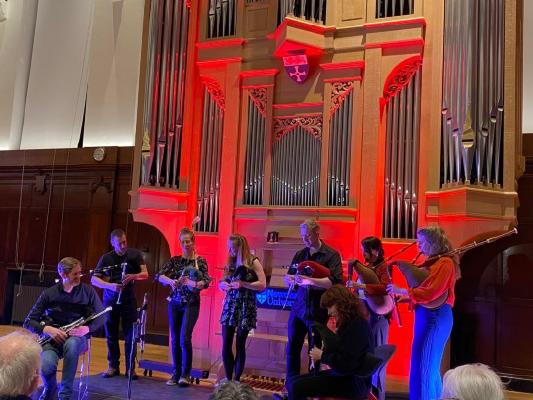The Bagpipe Society
The 6th IBO Conference
Early March saw me driving north to Newcastle Upon Tyne for the International Bagpipe Organisation’s Conference and my first ever visit to the city. The last conference was due to be held in Boston, USA in March 2020 and was cancelled just as the potential impact of Covid was being realised. Having attended so many online events over the last two years, it felt a strange prospect to be doing something as ‘normal’ as attending a session and a conference. As I climbed the stairs to a room above a noisy, bustling student pub, I was greeted by the sound of a Greek gaida and the waves and cheery hellos of friends not seen for far too long. What a great start to the weekend!

The venue for the sixth IBO conference was the grand setting of The King’s Hall at the University. The Hall was dominated by a magnificent organ, only installed in 2017 and sadly silent. I didn’t get to hear the organ sounds but I certainly heard plenty of bagpipes! One of the things I love about the IBO conference is the mix that the committee achieves of getting a balance between the academic and the ‘practical’, so there is something for those that are interested in research and those that simply enjoy the music and the sound of bagpipes. Yet again, the IBO committee had selected an excellent range of talks which also ensured that the majority of interests would be covered. Each session had a theme: Revivals and Weddings, Instrument Making, Historical Accounts and Traditional Piping, Bagpipes and Politics and finally, Shifting Practices Across Time. To complement the wide scope of topics, the various papers were delivered in a variety of styles and manners – from the somewhat dry approach of academic research through to the lively practical application of experiential learning. Each conference session was ‘piped in’ by one of the delegates giving everyone the signal to stop talking or looking at one of the display stands and get to their seats.

There was much I found of interest over the course of one and a half days: learning about the presence of the gaida in northern Greece from Athanasios Ouzounis, the history and revival of bagpipes in Lativa from Juris Lipnis. We were all entertained by the musette playing of Amanda Babington accompanied by the harpsichord. Musettes featured again with Bart Van Troyen’s story of his restoration challenge of an extremely rare variety of the instrument (see his full article later in this edition). Whilst the musette is probably the pinnacle of bagpipe instrument making, Andy May showed us a more ‘rustic’ side by looking at the pipemaking of renowned Northumbrian Smallpipe player, Tom Clough. Tom may have been one of the respected players but he will not win prizes for his instrument making skills. Having said that, they may not have the best finish but I have no doubt they played well and in fact, Andy owns and played at set by Tom’s making partner, Fred Picknell. Being in the north east, it was only right that the NSP should feature in the programme and as well as Andy’s talk, Rob Say made us all familiar with the Rook Manuscript, a large collection of over 1000 tunes, giving us a fascinating insight into early 19th century NSP repertoire and performance practice.

Ciarán MacMuchaidh showed us a different aspect of piping – how the instrument can be used as a form of protest. Many different examples of how piping and pipers used the instrument to either draw attention to a cause or be used to protest or lead protesters were given and his talk definitely drew lots more examples from the delegates present. Another area completely new to me was Estibaliz Santamaria Cadaval’s talk on how the gaita had been integrated into Cuban music and bands. There had been a Galician military garrison on the island during the late 19th century and although the military left after the Cuban Republic was formed in 1902, many of the Galicians stayed on and settled there and retained their native bagpipes which they integrated with the local music culture.
The new, post Covid world has meant that online talks and zoom meetings are no longer alien events. Whilst it was fantastic meeting everyone and having a ‘physical’ conference, the new familiar online technology meant that we could easily connect to presenters who could not get to Newcastle for one reason or another. It was a joy to have Eric Montbel join us, albeit online. Eric, in effect, gave us two talks in one: the links between the French and Italian bagpipe playing traditions; the art instruments of the musette and sordellina and the rustic playing of the zampogna and chabrettes and cabrettes from the Auvergne. Eric took us through the Italian influence of zampogna and accordion players on the early days and development of the bal-musette in Paris. We probably needed another hour at least for the range of material he covered!
However, for me, the highlight of the conference was the first session on Sunday morning when we were treated to a showing of the film The Journey of the Askavlos by Yorgos Arvantis. We were joined by Yorgos online who gave the background to the making of the film and was there to take questions and feedback after the showing. I think we were all so entranced and enthralled by what we had just seen to ask too much. There is an interview with Yorgos about the making of the documentary in this edition of Chanter and I really would encourage you all to watch the film if you can – it’s a stunning work.
There’s so much more to this event than sitting listening to papers. There was a concert for a start! The event coincided with the 3rd Newcastle Piping Festival and it was run as a joint event with the Northumbrian Pipers Society. I had been unable to get to the city in time for the Friday afternoon concert but I would have been treated to performances by Andy May, Alice Robinson, Iain Gelston & Chloe Jones and special guest from Belgium, (and Chanter cover star!) Marieke Van Ransbeeck. No matter, because they all performed again on Saturday night as well as other performances by Lucia Wagner from Austria, Tiarnán Ó Duinnchinn from Ireland, Ailis Sutherland from Scotland and a guest star appearance from IBO member, Cassandre Balosso Bardin. It was a series of stunning performances which was also live-streamed for those that could not be there. It was also very gratifying to see so many female pipers headlining the concert and, for once, women outnumbered the men!

This being a gathering of pipers, there were, of course, sessions. The Saturday evening ended, for me at least, with another visit to the top room of the pub where we were all treated to some great piping of all shades, varieties and types. Dancing ensued. I gather the celebrations continued long after I left judging by some of the looks on some delegates on Sunday morning! The weekend concluded with a visit to the Morpeth Bagpipe Museum on Sunday afternoon followed by yet more playing both there and in the evening.
Well done to the IBO committee and organisers for arranging such a great event. It was indicated that the next conference, in 2024, will be taking place somewhere in Europe. Regardless of where it is, I would certainly encourage you to attend – you won’t be disappointed.
By International Bagpipe Organisation Moulder, Jane Trad Various
From Chanter Summer 2022.
- Data Processing Notice (GDPR)
-
@BagpipeSociety on X (formally known as Twitter)
-
TheBagpipeSociety on Instagram
-
 BagpipeSociety on Facebook
BagpipeSociety on Facebook
Something wrong or missing from this page? Let us know!
